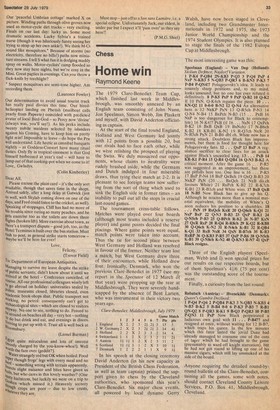Chess
Home win
Raymond Keene
The 1979 Clare-Benedict Team Cup, which finished last week in Middlesbrough, was smoothly annexed by an English team consisting of John Nunn, Jon Speelman, Simon Webb, Jim Plaskett and myself, with David Anderton officiating as captain.
At the start of the final round England, Holland and West Germany led jointly with 12 points from a possible 20, but our rivals had to face each other, while we were relishing the prospect of playing the Swiss. We duly massacred our opponents, whose claims to neutrality were rudely brushed aside, while the Germans and Dutch indulged in four miserable draws, thus tying their match at 2-2. It is pleasant to see foreign teams now suffering from the sort of thing which used to sink the English side in former times an inability to pull out all the stops in crucial last-round games.
The tournament cross-table follows. Matches were played over four boards (although most teams included a reserve player) and game points decided the final placings. Where game points were equal, match points were taken into account. Thus the tie for second place between West Germany and Holland was resolved in favour of the former. Neither team lost a match, but West Germany drew three of their encounters, while Holland drew four. Ironically, Denmark, who won the previous Clare-Benedict in 1977 (see my
report in the Spectator of 12 March cif that year) were propping up the rear at Middlesbrough. They were severely hand.icapped by the absence of Bent Larsen, who was instrumental in their victory two year ago.
In his speech at the closing ceremony David Anderton (in his new capacity as President of the British Chess Federation, as well as team captain) praised the support given to chess by the Cleveland authorities, who sponsored this year's Clare-Benedict. Six major chess events, all powered by local dynamo Gerry
Walsh, have now been staged in Cleveland, including two Grandmaster Internationals in 1972 and 1975, the 1973 Junior World Championship and the 1974 Student Olympics. It is also planned to stage the finals of the 1982 Europa Cup at Middlesbrough.
The most interesting game was this: Speelman (England) Van Dop (Holland): Sicilian Defence, Najdorf Variation.
1 P-1C4 P-Q134 2N-KB3 P-Q3 3 P-04 PxP 4 NxP N-KB3 5 N-QB3 P-QR3 6 B-KN5 P-K3 7 P-B4 P-QN4!? Polugayevsky's idea. It leads to insanely sharp positions and, to my mind, looks unsound, but no one has ever refuted it definitively. 8 P-K5 PxP 9 PxP Q-B2 10 Q-K2 If 10 PxN, Q-K4ch regains the piece. 10 . KN-Q2 11 0-0-0 B-N2 12 Q-N4 An alternative here is 12 NxKP PxN 13 Q-R5ch P-N3 14 Q-N4 N-B4 15 BxPch N-B3 (15 . . . PxB 16 NxP is too dangerous for Black to contemplate) 16 N-K4!? PxB (if 16 . . . NxN 17 QxPch B-K.2 18 BxB QxB 19 BxNch) 17 N-B6ch K-B2 18 KR-B1 K-N2 19 R-Q7ch NxR 20 ' N-R5ch PO 21 B-B6 dbl ch. White now has a strong attack. Doubtless Black has improvements, but there is food for thought here for Polugayevsky fans. 12 .. . ()xi' 13 BxP A regulation sacnfice to clear lines for an attack against Black's uncastled king. 13 .. . PxB 14 KR-K1 P-R4 15 Q-R4 Q-QB4 16 Q-N3 B-K2 A critical moment. After the game 16 . . . P-R5 was suggested as an improvement, but there
are pitfalls here too. One line is 16 P-R5 17 BxP P-N4 18 BxP QxBch 19 QxQ B-R3 20
NxKP PxN (20 . BxQch 21 NxB dis.ch, favours White) 21 111xPch K-B2 22 R-K7ch K-B1 23 R-Blch and White wins. 17 BO QxB 18 N-B5 Now Black has to give up his Q. . Although he retains more than a nominal material equivalent, the mobility of White's Q soon reduces his position to a shambles. 18 PxN 19 RxQch KxR 20 Q-Q6ch K-Q1 21 NxP BxP 22 Q-N3 B-B3 23 QxP R-K1 24 Q-N5ch P-B3 25 Q-BPch R-K2 26 N-87 KxN 27 QxR RxP 28 R-Q4 R-R8ch 29 K-Q2 R-KB8 30 Q-Q6ch K-N2 31 R-N4eh K-Bl 32 R-QB4 K-Q1 33 RxB NxR 34 Qxlsi R-B7ch 35 K-B3
RxRP 36 Q-KB3 P-R5 37 QxP P-R6 38 Q-N5ch K-B1 39 Q-N8ch K-N2 40 Q-KN3 R-N7 41 QxP Black resigns.
Three of the English players (Speel man, Webb and I) won special prizes for our results on our respective boards, but of them Speelman's 4i/6 (75 per cent) was the outstanding score of the tourna ment.
Finally, a curiosity from the last round: Robatsch (Austria) Hvenekilde (Denmark): Queen's Gambit Declined.
1 P-Q4 P-Q4 2 P-QB4 P-K3 3 N-QB3 N-KB3 4 N-B3 B-K2 5 B-B4 0-0 6 P-K3 P-B3 7 R-B1 QN-Q2 8 P-QR3 R-K1 9 B-Q3 P-QR3 10 P-135 P-QN3 11 PxP Now Black perpetrated a ludicrous own goal with 11 ... P-B4?? and resigned at once, without waiting for 12 B-B7, which traps his queen. In the few minutes which this farce Tasted the jovial Dane had 'already managed to consume one of the cans of lager which he had brought to the game (presumably to ward off knight starvation), but he had not got round to lifting up one of his massive cigars, which still lay unsmoked at the side of the board.
Anyone requiring the detailed round-byround bulletin of the Clare-Benedict, containing all the games, some with notes, should contact Cleveland County Leisure Services, P.O. Box 41, Middlesbrough, Cleveland.






































 Previous page
Previous page